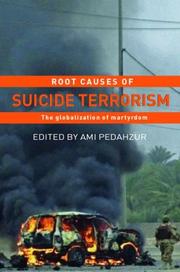| Listing 1 - 3 of 3 |
Sort by
|

ISBN: 0415770297 0415770300 9780415770293 9780415770309 9780203964910 9781135987329 9781135987367 9781135987374 Year: 2006 Publisher: London : Routledge,
Abstract | Keywords | Export | Availability | Bookmark
 Loading...
Loading...Choose an application
- Reference Manager
- EndNote
- RefWorks (Direct export to RefWorks)
Suicide terrorism in its modern form appeared in the 1980s. The first organization to use this strategy was the Shi'ite Hizbollah in Lebanon. Later, it was adopted by many terrorist organizations in the Middle East and Asia. This new study shows how there are at least two reasons to question the central role that is assigned to religion and more specifically Islam when explaining suicide terrorism. First, suicide terrorism is a modern phenomenon, yet Islam is a very old religion. Except for two periods in the 12th and 18th centuries, suicide was never part of Islamist beliefs and behaviors. Actually, Islam clearly forbids suicide. Hence, the argument that Islamic religious beliefs are the main cause of suicide terrorism is inherently dubious. Second, many suicide attacks have been carried out by secular organizations with little connection to fundamentalist Islam: Palestinian Fatah, the Popular Front for the Liberation of Palestine, the Kurdish Workers Party. Moreover, one of the organizations that has employed this strategy devastatingly and regularly is the LTTE (Liberation Tigers of Tamil Elam). Not only are members of this organization not Muslim, most of them are not religious at all. This superb book contains essays by some of the world's leading scholars of terrorism and political violence. It is essential reading for students of terrorism, political science and Middle Eastern politics, and useful to students of social psychology, theology and history.
Suicide bombings --- Suicide bombers --- Terrorism --- Attentats-suicides --- Kamikazes (Attentats-suicides) --- Terrorisme --- Psychology. --- Religious aspects --- Islam. --- Psychologie --- Aspect religieux --- Islam --- Suicide bombings. --- Terrorism.
Book
ISBN: 9780367457617 9781032104232 9781003026303 Year: 2022 Volume: v. 28 Publisher: New York, NY : Routledge,
Abstract | Keywords | Export | Availability | Bookmark
 Loading...
Loading...Choose an application
- Reference Manager
- EndNote
- RefWorks (Direct export to RefWorks)
"Theories of Terrorism explains and advances the major theories of terrorism that address issues of becoming a terrorist, being a terrorist, and leaving terrorism, in a clear and accessible format for use by students and academics seeking to advance theoretically driven research in the area. Readers will gain an understanding of the most promising explanations of terrorism that have been developed to date and how they can be used to explore core substantive issues related to the topic. The content is delivered with a scholarly depth, though still accessible by students at different levels. The book offer explains for the three phases of radicalization, covering emerging topics such as women's involvement in terrorism, fear of terrorism, the code of the terrorist, and suicide terrorism. This is the first book in the Advances in Criminological Theory Series to address the issue of terrorism and emphasizes the use of theory for future research development. The style and content coverage of the book make it appropriate as a supplemental text in undergraduate courses on terrorism and political violence. The inclusion of current empirical literature and guidance for future research efforts gives the text appeal for graduate students and academics in the disciplines of criminology/criminal justice, political science, sociology, and interdisciplinary terrorism studies. The emphasis on theory and the radicalization process throughout the text will also make the book useful as a reference for general graduate-level theory courses within these areas"--
Terrorism --- Bombers (Terrorists) --- Criminology. --- Terrorists --- Terrorisme --- Terroristes. --- Criminologie --- Kamikazes (attentats-suicides) --- Research. --- Psychology. --- Psychology --- Recherche. --- Psychologie --- Criminology --- Research --- TERRORISM--RESEARCH --- BOMBERS --- CRIMINOLOGY --- Bombers (Terrorists).

ISBN: 0231133200 0231509863 9780231509862 Year: 2005 Publisher: New York : Columbia University Press,
Abstract | Keywords | Export | Availability | Bookmark
 Loading...
Loading...Choose an application
- Reference Manager
- EndNote
- RefWorks (Direct export to RefWorks)
Mia Bloom examines the use, strategies, successes, and failures of suicide bombing in Asia, the Middle East, and Europe and assesses the effectiveness of government responses. She begins with a review of the long history of terrorism, from the Japanese kamikazes during World War II, to the Palestinian, Tamil, Iraqi, and Chechen terrorists of today. Bloom explores how suicide terror is used to instill public fear, attract international news coverage, gain support for terrorist causes, and create solidarity or competition between disparate terrorist organizations. She also considers how terrorist groups learn from one another, how they respond to counterterror tactics, and where they receive their funding, and a new preface features an in-depth study of modern-day Pakistan, Somalia, and Iraq. Bloom boldly contends that social and political motivations inspire suicide bombers, and she develops a theory explaining why terrorist tactics work in some instances and fail in others.
Acts of terrorism --- Bombardiers suicides --- Bommenwerpers [Zelfmoord] --- NGO's --- NGOs (International agencies) --- Niet-gouvernementele organisaties --- Non-governmental organizations --- Nongovernmental organizations --- ONG --- Organisaties [Niet-gouvernementele ] --- Organisations non-gouvernementales --- Organizations [Non-governmntal ] (International agencies) --- PVOs (International agencies) --- Private and voluntary organizations (International agencies) --- Suicide bombers --- Terrorism --- Terrorisme --- Terrorist acts --- Zelfmoordbommenwerpers --- Terrorism. --- Suicide bombers. --- Non-governmental organizations. --- Kamikazes (Attentats-suicides). --- POLITICAL SCIENCE --- INGOs (International agencies) --- International non-governmental organizations --- Organizations, Non-governmental (International agencies) --- Attacks, Terrorist --- Global terrorism --- International terrorism --- Political terrorism --- Terror attacks --- Terrorist attacks --- World terrorism --- International agencies --- Nonprofit organizations --- Bombers (Terrorists) --- Direct action --- Insurgency --- Political crimes and offenses --- Subversive activities --- Political violence --- Terror
| Listing 1 - 3 of 3 |
Sort by
|

 Search
Search Feedback
Feedback About UniCat
About UniCat  Help
Help News
News